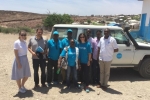This Bank Holiday weekend, I am visiting the African country of Djibouti with UNICEF. Djibouti is a small country with a population of just over one million, but hosts the key strategic port for the Horn of Africa. It is surrounded on land by Ethiopia, Somalia and Eritrea. Across the Dead Sea is Yemen. Many residents from these neighbouring countries are fleeing their homelands. Djibouti tends to be a transit point for these migrants who are on the move for a better life.
The purpose of my visit is to see the work which UNICEF carries out for the young people in Djibouti with the support of UK Aid. Next month, UNICEF are once again holding their Soccer Aid fundraising football programme. The UK Government have committed to match-fund this event up to £5m. Whilst the celebrities and ex-professionals will be turning out at Old Trafford, I will be playing in less salubrious surroundings when a team of MPs play each other for Parliamentary Soccer Aid. Proceeds from previous Soccer Aid matches are being used to help the young children of Djibouti and more will follow across the globe if the public once again give their generous support.
Children make up 40% of the Djiboutian population and their challenges are stark. The mortality rate is 68 out of 1,000 births (in the UK this figure is 3.7). 30% of the children are malnourished and 17% are classified as seriously malnourished. One out of five children are not in school. 78% of girls and women have undergone female genital mutiliation or cutting (FGM/C). The unemployment rate is over 70%. Many children are living in remote refugee camps, having migrated from war-torn countries nearby. However, thanks to the support of organisations such as UNICEF, and aid from the UK taxpayer, things are improving in many areas. The mortality rate may still be too high but it has halved over the last 15 years. FGM/C has fallen from 93% over the same period. The Millenium Development Goal of improved water has been met. A new education and justice programme is being rolled out by the Djiboutian Government.
Just over a year ago, I visited the Syrian border with Save the Children to see how UK Aid was helping those displaced from their country. On my return, I spoke out for those refugees, for the organisations who support them and for the UK Government’s commitment to aid spending. I hope that this trip will similarly allow me to shine a light on the great work which UNICEF carry out and to champion those young people who lack the education, health and work opportunities which we take as our bare minimum back home.



